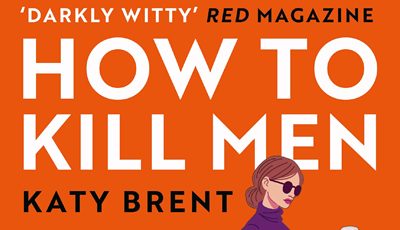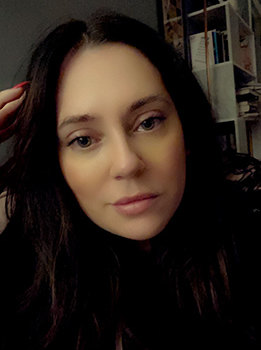

Latest Books Spotlight: Katy Brent
Sex and the Serial Killer
“Yes, I kill men, but only men who deserve it.”
In HOW TO KILL MEN AND GET AWAY WITH IT, Kitty Collins is a professional influencer from London enmeshed in the Instagram world despite being over it and the people climbing for status. She’s also over the Neanderthalic idea that women owe men sex simply because they bought a girl a drink.
As a member of a society where women are treated as second-class citizens, Kitty is ready to stab the patriarchy. Literally.
The first murder was an accident. A man slipped and fell on a broken bottle after angrily pursuing her out of a club because he bought her a drink, and she didn’t agree to sleep with him. The second one was self-defense. The rest? Those were justice.
Yes, she’s a serial killer, but the reader can’t help but sympathize with her. She’s incredibly loyal to her friends, loves her mother, mourns for her missing father and longs to live in a world where she and her friends don’t have to watch their backs and drinks every time they go out at night.
The Big Thrill was delighted to sit down with Katy and talk about influencers, #MeToo, and the slippery slope of vigilantism.
What inspired you to write HOW TO KILL MEN AND GET AWAY WITH IT?
A lot of things came together at once, really. I’d started off doing an online course with Faber Academy, which was [how to write] a novel. I had this seed of an idea I pitched to them as a “stabby Sex in the City.” I thought: what if instead of writing about her friends’ bad experiences with men, Carrie went out and murdered them?
Initially, it was supposed to be a completely comedic book. The working title was Buffy the Fuckboy Slayer. But the landscape changed quite massively while I was writing. We were post #MeToo, and then we went into lockdown. There were so many statistics in the news about how incidents of domestic violence had risen, so it became a way to talk about the men who were committing these violent acts and getting away with it.
There was obviously this really strong feeling, and I wanted to make her into a vigilante who was dishing out justice to these men who’d escaped. [The novel] went from being something that was supposed to be quite lighthearted and funny to much more of a social commentary.
How do you feel about HOW TO KILL MEN being called a “stabby Sex and the City” or a “feminist Dexter?”
Really pleased. I think those are high compliments. Both of those books and subsequently shows, have had a huge impact on pop culture. So, yeah, it’s flattering.
At first, Kitty comes across as a typical shallow rich girl, yet as we get to know her, we find a surprising depth when it comes to the loyalty and genuine love she shows her friends, which makes it easy to like her. What can you tell us about this journey?
I had this seed of an idea I pitched to them as a “stabby Sex in the City.” I thought: what if instead of writing about her friends’ bad experiences with men, Carrie went out and murdered them?She’s an heiress as well [as being an influencer], so [this world] it’s something she’s almost inherited rather than actively gone for. But she finds it extraordinarily vacant and vacuous, so she’s trying to find her place or her reason in the world.
[Writing HOW TO KILL MEN AND GET AWAY WITH IT] turned out to be quite an organic journey for Kitty. I knew I wanted her to start off disillusioned, but by the end of it, she’s found meaning. I was trying to make sure she still comes across as compelling and relatable, even though she’s doing these atrocious things. Throwing in some of her backstory…gives much more depth to her—she’s not this sort of one-trick psychopath who is just murdering men without reason.
Part of her journey is meeting Charlie, who seems to be the one decent man in the entire novel, and her worldview shifts. This could be an example of the trope “the love of a good man can save her,” but it’s more complicated than that. Can you explain why?
Despite Kitty’s sharpness and edges and complexity, she just wants to be loved. She’s got some extreme daddy issues. [Her dad went missing when she was young.] But I think she’s a bit of a secret romantic and a believer in that trope. She thinks that being with this man will change her, and she wants it to.
There seem to be more books featuring problematic or messy women heroes. We have popular books by May Cobb, Gillian Flynn, and Meredith Hambrock with very complex and “problematic” women. What do you think is driving this popularity?
I think Gone Girl [by Gillian Flynn] drove that genre of female characters and was a huge success despite Amy not being particularly likable. But she is relatable, and she is compelling. I like reading about people who have got complex inner lives because I don’t think I’ve ever met anyone who doesn’t have a complex inner life.
Your male characters can go around being problematic all over the place and no one questions their likability, but with female characters, I think there’s a condition that they have to be likable. There’s an author, whose name I can’t think of now [Florence Given], who has a book titled, Women Don’t Owe You Pretty, but I also think that women don’t owe you likable, either.
What’s next for you?
My second novel will be out in February in the UK, and I think in the US in June next year. It’s a standalone murder mystery with a dead woman in this one. There’s a lot of grief. I lost someone very close to me while I was writing this second book, and that helped me process my loss quite a lot, but it’s still got humor. I’m writing my novels through a rom-com lens. That sort of voice helps me deal with these harder-hitting subjects.
- LAST GIRL MISSING with K.L. Murphy - July 25, 2024
- CHILD OF DUST with Yigal Zur - July 25, 2024
- THE RAVENWOOD CONSPIRACY with Michael Siverling - July 19, 2024


